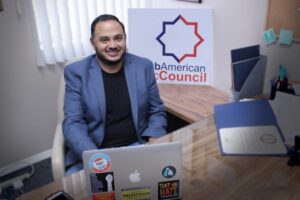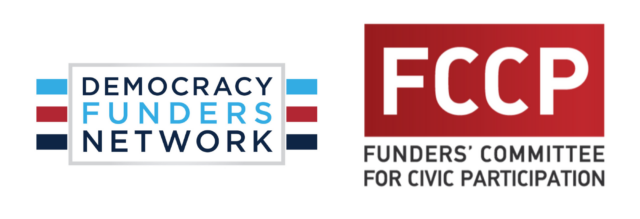Proteus Fund’s March 2023 Newsletter
As spring approaches, I’m reminded again that we are entering a season of renewal. This is especially true at Proteus Fund, where, as you have hopefully seen in our other communications, we have welcomed several incredible new colleagues. These new leaders for the Piper Fund and Rights, Faith & Democracy Collaborative (RFDC) bring a wealth of expertise, diverse experiences, and networks to their roles, which will serve the field well as we continue to sharpen and grow each collaborative.
Since our last newsletter, we’ve also experienced a significant enhancement of our programs and work thanks to the transformational investment in Rise Together Fund and the movements it supports through a Mackenzie Scott grant! In addition, two of Proteus Fund’s highly impactful fiscally sponsored projects (FSPs), Third Wave Fund and Contigo Fund, were also grant recipients in this latest round of funding from this philanthropist.
In addition to the highlights above, in this issue of our newsletter, we share other information on work we are doing to deepen both our mobilization of philanthropy to support critical social justice movements and our partnership with our funders and grantees alike. While the newest wave of reactionary forces in the country at times seems overwhelming, the call to action for all of us is to ensure that our collective will, skills, passion, and strategies are infinitely greater.
— Paul
In addition to supporting social justice movements through Proteus Fund’s work, our team members are sharing their expertise and experience in spaces that amplify our focus on racial, gender, queer, and disability justice.
Since its inception, RISE Together Fund has supported grantees’ work to build community power in Black, African, Arab, Middle Eastern, Muslim, and South Asian (BAMEMSA) communities in pursuit of a multiracial, inclusive, and representative democracy. An essential component of this work is the ability of our grassroots organizations to reach and activate larger segments of BAMEMSA communities on critical issues. Too often these efforts are stymied by lack of capacity, infrastructure and access to community voter data.
Since 2019, RTF has systematically addressed these challenges, and as the next natural step in this work, this year, RTF has launched a new two-year civic engagement fellowship pilot program to encourage year-round civic engagement beyond elections through dedicated staff capacity. The grant program is being piloted with two organizations, CAIR-AZ and Arab American Civic Council. Both organizations will recruit and hire a civic engagement fellow, as well as work closely with Dr. Tom Wong, RTF’s data consultant who has supercharged grantees’ non-partisan civic engagement work through culturally competent data access and analysis.
Rashad Al-Dabbagh, founder and executive director of the Arab American Civic Council, shared his perspective on the potential impact of the civic engagement fellowship grant for the organization.

Civic participation is a central element of AACC’s work. Why is this essential for building community power for Arab Americans?
Arab Americans have faced many challenges that led them to become intimidated and hesitant to participate in the democratic process. The root causes of these challenges are marginalization, structural racism, and lack of familiarity with the U.S. political system. When Arab Americans actively participate in civic affairs and have their voices heard, negative perceptions about Arab Americans will change, and our values will be reflected in policies made by representatives who understand our community’s needs.
How will having additional capacity in the form of a dedicated civic engagement fellow help to move your civic empowerment efforts forward?
With very limited capacity, the Arab American Civic Council has been reaching thousands of Arab American voters to encourage them to vote and engage with their elected representatives. In the 2022 primaries, we made 22,300 calls to voters and sent 5000 text messages to likely (Middle Eastern North African) MENA voters in Orange County. During the 2022 general midterm elections, we sent text messages to 31,054 cell phones on file and made 15,868 calls to landlines on file. In addition, we canvassed 2,733 likely MENA households in Orange County, primarily in the cities of Anaheim and Irvine. We did this with limited resources and only one full-time staff member who had other primary responsibilities in addition to one part-time and one temporary hire. With a dedicated civic engagement fellow on our team, we can make a much greater impact.
As a participant in this two-year pilot program, how do you envision or hope your experiences will have a lasting impact?
Our long-term civic engagement goal is to move Arab Americans from disenfranchisement to full civic participation. Arab Americans will be stronger with increased participation from all of the unique sub-groups and neighborhoods in Orange County. More specifically, we envision full Arab American participation in the affairs of the City of Anaheim that will lead to social and physical improvements in the newly-designated Little Arabia district.
 Piper Fund Team Members and Grantees Participate in National Philanthropic Mobilization Events
Piper Fund Team Members and Grantees Participate in National Philanthropic Mobilization EventsEducating the philanthropic community through the insights and lessons learned in Proteus Fund’s field-facing, grantee- and movement-centered work is an integral part of our work to mobilize and align resources and improve philanthropic practice. Members of the Piper Fund team are doing just that this spring, sharing impactful takeaways on Money in Politics and Protecting the Right to Protest initiatives with national audiences.
Program Associate Monica Kim served as a panelist in a recent event hosted by the Democracy Funders Network (DFN), and in April, Program Officer Tiffany Mendoza will lead a panel featuring Piper Fund grantees at the Funders’ Committee for Civic Participation (FCCP) Annual Convening, one of the leading gatherings of civic engagement philanthropy in the country. That panel discussion will be moderated by long-serving Proteus Action League (PAL) Board Member Ludovic Blain.
The DNF event titled “Free Speech Under Fire” was designed to give funders an opportunity to learn more about the multi-faceted and coordinated challenges to free speech and how to protect and revitalize it. Key insights Monica shared with attending funders included:
FCCP’s Annual Convening, which will take place in New Orleans this year, is set to draw funders and field experts from across the country to explore the critical issues facing democracy. The session organized by Piper Fund, called “Small Donor, Big Impact: Structural Reforms for an Inclusive Democracy,” will examine recent victories, like proactive reform in Oakland, which saw passage of the second democracy dollar program in the nation. This model has been successful in democratizing political giving in Seattle by diversifying the donor pool while increasing voter turnout among historically disenfranchised communities. Building off this victory, other coalitions are forming to mitigate the influence of big money and building a roadmap for an inclusive multi-racial democracy.
Representatives from Ohio Organizing Collaborative, Common Cause CA, and the Washington Bus, all of which are Piper Fund grantees, will provide perspective on building intentional multi-racial coalitions. Key takeaways for session attendees will be:
Piper Fund is grateful to have PAL Board Member Ludovic Blain, who is also the executive director of the California Donor Table, serving as the panel moderator. Under Ludovic’s leadership, the CDT family of entities has mobilized more than $50 million to build and sustain progressive people of color-centered policy and political power building and wielding across California.